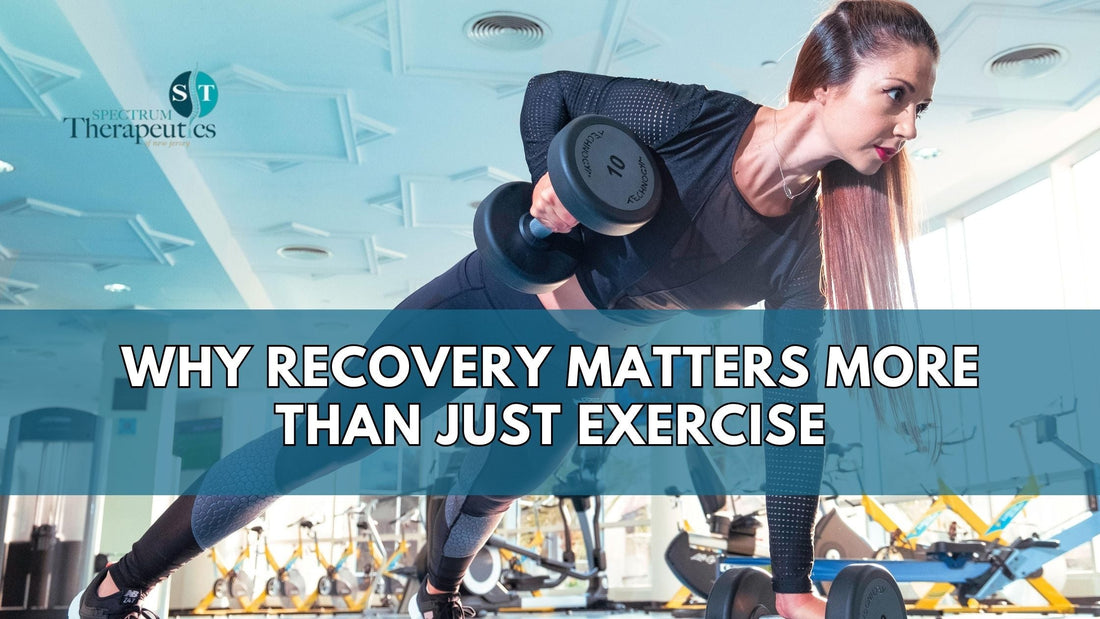
Why Exercise Alone Isn't Enough: A Physical Therapist's Perspective on Recovery
Dr. Rob Letizia PT, DPTShare
Let Me Share What I've Learned
After 20 years as a physical therapist, I've noticed something that might surprise you: some of my most dedicated patients, the ones hitting the gym religiously, aren't seeing the results they expect. They're frustrated, tired, and wondering why all their hard work isn't paying off.
Here's what I think is happening, and more importantly, what we can do about it.
My Own Journey
Three years ago, I was that guy. Training six days a week, eating what I thought was right, but feeling exhausted most of the time. My sleep was terrible, my energy would crash every afternoon, and honestly, I was pretty grumpy after workouts.
My wife mentioned I always looked tired. My daughter asked why I seemed frustrated after the gym. That got me thinking, if exercise is supposed to make me feel better, why did I feel worse?
That's when I started looking beyond just the exercise piece and considering the whole picture of recovery and wellness.
The Recovery Gap
Here's what I know from a PT perspective: when you strength train, you create controlled damage to muscle tissue. That's normal and necessary for growth. But your body needs the right conditions to repair that damage effectively.
Think of it like renovating a house. You can tear down walls all day long, but without proper materials, tools, and time for reconstruction, you just end up with a mess.
Many of us focus intensely on the "tearing down" part (working out) while giving less attention to the "rebuilding" phase (recovery and lifestyle factors).
What I've Learned About Supporting Recovery
Disclaimer: I'm speaking as a physical therapist about movement and recovery. For medical concerns, always consult with your physician.
1. Sleep is Non-Negotiable
This isn't just PT advice, it's basic physiology. Sleep is when your body does most of its repair work. Without adequate sleep, you're asking your muscles to recover without giving them the time they need.
I had to get serious about sleep hygiene. Same bedtime every night - 10 PM. Same wake time - 5:30 AM, even on weekends. No screens in the bedroom. Cool, dark room.
Did it feel obsessive at first? Yeah. But the difference in how I felt during workouts and throughout the day was incredible.
2. Nutrition Timing Matters
As a PT, I see how nutrition impacts recovery. I'm not a dietitian, so I always recommend patients work with qualified nutrition professionals for detailed meal planning.
What I can share from my experience: I started paying attention to post-workout nutrition and spreading protein throughout the day rather than loading it all at dinner. The difference in muscle soreness and recovery time was noticeable.
3. Stress Management
This one surprised me. Chronic stress, whether from work, relationships, or even overtraining, can interfere with recovery. Your body doesn't distinguish between different types of stress when it comes to hormone production and inflammation responses.
I started incorporating basic stress management techniques. Nothing fancy, just 10 minutes of deep breathing before bed, taking actual lunch breaks, and being more intentional about downtime.
4. Movement Quality Over Quantity
Sometimes the answer isn't more exercise, it's better exercise. I started focusing more on movement quality, proper warm-ups, and actually listening to my body's signals.
Some days that meant scaling back intensity. Other days it meant addressing mobility issues I'd been ignoring. The result? Better workouts and fewer aches and pains.
5. Professional Support When Needed
This is important: there are limits to what any single professional can address. As a PT, I focus on movement, exercise prescription, and injury prevention. But optimal health involves many factors that require different expertise.
I encourage my patients to build a team when needed, primary care physicians for overall health, registered dietitians for nutrition, mental health professionals for stress management, and specialists for specific medical concerns.
The Bigger Picture
Strength training is absolutely important, it's one of the best things you can do for long-term health, mobility, and independence as you age. But it's one piece of a larger puzzle.
The other pieces, sleep, nutrition, stress management, and addressing any underlying health issues, are equally important. When they all work together, that's when people start seeing the results they've been working toward.
What This Looks Like in Practice
I didn't overhaul everything at once. That's a recipe for burnout. Instead, I picked one area to focus on for about a month, then gradually added others.
Started with sleep, that gave me more energy for everything else. Then I worked on post-workout nutrition. Then stress management. Each change built on the previous one.
The key was consistency over perfection. Some nights I still don't get perfect sleep. Some days my nutrition isn't ideal. But most of the time, I'm hitting my targets, and that's made all the difference.
Moving Forward
If you're putting in work at the gym but not seeing results, consider looking at the bigger picture. Are you giving your body what it needs to actually adapt to your training?
Sometimes a small adjustment in recovery habits can unlock the progress you've been working toward.
Important Note: If you're experiencing persistent fatigue, sleep issues, digestive problems, or other health concerns, please consult with your primary care physician. These can sometimes indicate underlying medical conditions that need proper evaluation and treatment.
About Dr. Rob: Dr. Rob Letizia is a Doctor of Physical Therapy with 20 years of experience helping people move better and feel stronger. His practice focuses on strength training, injury prevention, and optimizing movement patterns for long-term health.
For movement-related questions or to schedule a consultation: (973) 689-7123



